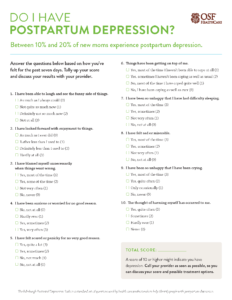
Is it just baby blues or postpartum depression?
Feeling anxious or depressed after giving birth can be difficult for moms to face. You may feel ashamed. You might blame yourself for having trouble finding happiness during what you thought would be a joyous time.
The baby blues are the least severe and most common form of these feelings. Beginning a day or two after delivery, the baby blues typically go away in a couple weeks. Four out of five new moms experience the baby blues, according to the March of Dimes.
The cause of postpartum blues is believed to be related to the sudden change in hormones after delivery.
For about one in seven new moms, the baby blues turn out to be something more serious – postpartum depression (PPD). It’s the most common complication related to pregnancy. You don’t want to risk ignoring it in the hope that it goes away.
Postpartum depression in men is also pretty common. It impacts about 10% of new fathers.
What are the symptoms?

Postpartum depression quiz
Download
There are several symptoms that may indicate postpartum depression. The symptoms include:
- Unable to bond with your baby
- Postpartum anxiety leading to panic attacks
- Daily depression
- Severe mood swings
- Decreased energy levels
- Feelings of shame or guilt
- Frequent crying
- Trouble finding any humor, fun or joy in things
- Trouble sleeping or sleeping too much
If your blues don’t go away in a couple weeks, tell your provider. If your symptoms go beyond being moody, cranky or feeling sad, tell your provider. You may have postpartum depression.
It can make caring for your baby difficult. It can cause major strains to your relationships with friends and family members, as well.
At its most severe, postpartum depression can cause thoughts of hurting yourself or your baby. Go to the emergency department for immediate care if you have these kinds of thoughts.
An even more severe mental illness is a rare condition called postpartum psychosis. Delusions and hallucinations are the most common symptoms of postpartum psychosis. You need immediate care if you experience these signs of psychosis. Call 9-1-1 or go to the emergency department.
Postpartum depression screening
After giving birth, your provider should talk to you about postpartum depression before you leave the hospital.
“They should screen you for it then, and at each postpartum visit,” said Vanessa Foster, MD, an obstetrician and gynecologist at OSF HealthCare. “Now, the pediatricians also screen moms for postpartum depression. I’ve had postpartum depression for several of my patients identified through their baby’s pediatrician.
“If you’ve had a vaginal delivery, your OB/GYN doesn’t see you until six weeks postpartum. You’ll see the pediatrician before you see the obstetrician. So, a lot of times a pediatrician is the one who is the gatekeeper who picks it up before we do.”
The most commonly used tool to help identify possible cases of postpartum depression is called the Edinburgh Postnatal Depression Scale. This postpartum depression quiz is made up of 10 multiple choice questions that examine your mental state over the past week.
Your answers are scored. The higher the score, the more likely it is you suffer from postpartum depression.
How long does postpartum depression last?
Postpartum depression can last for years after giving birth, especially if it’s not treated. For some, it can last months, years or may never go away without treatment.
“It can get better on its own, but it can also get really bad,” Dr. Foster said. “So we don’t wait for it to get better on its own.”
It also puts you at risk for major depressive episodes later on.
What can you do to overcome postpartum depression?
“If you have a good support system, that always helps,” Dr. Foster said. “And, if you have a good relationship with your physician, that will always help, too.”
Your provider will work with you to find a treatment plan that works. There are plenty of options.
Cognitive behavioral therapy, support groups, antidepressants, anti-anxiety medication, estrogen and progesterone are all current methods for dealing with postpartum mental illness.